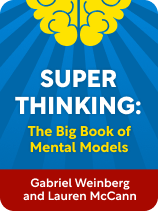

This article is an excerpt from the Shortform book guide to "Super Thinking: The Big Book of Mental Models" by Gabriel Weinberg and Lauren McCann. Shortform has the world's best summaries and analyses of books you should be reading.
Like this article? Sign up for a free trial here.
What are some things you should consider when hiring for your team? Should you only hire the best of the best?
To build an effective team, recruiting only all-star employees won’t work, because Joy’s Law states that most of the smartest, highly talented people in the world always work for someone else. Since you can’t bank on everyone being a natural all-star, it’s crucial to instead harness your employees’ potential.
Gabriel Weinberg and Lauren McCann offer some tips for building an effective team.
Organizational Culture
The first step toward building an effective team is creating a strong organizational culture. In short, organizational culture refers to the shared beliefs, practices, and values of a given organization.
Weinberg and McCann clarify that strong organizational culture isn’t one-size-fits-all. Still, certain steps are essential to shaping a positive culture, including:
- Designate a concrete north star.
- Make your core values explicit.
- Reward employees for outstanding performances.
- Embody your desired norms and values.
By taking these steps, leaders can actively shape company culture in the desired direction.
| More Ways to Improve Organizational Culture While Weinberg and McCann view organizational culture as only one component of thriving businesses, Patrick Lencioni argues that it’s the single biggest advantage a business can attain. In The Advantage, Lencioni offers several recommendations for improving organizational culture to supplement Weinberg and McCann’s strategies: – Encourage healthy debate among the leadership team, allowing members to determine the best idea on its merits. – Foster accountability among team members. This decreases the burden on leaders to hold everyone accountable. – Implement achievable short-term goals. This guarantees consistent improvement and prevents stagnation. Although these steps don’t invoke mental models, they offer helpful insights into the foundation of a healthy organizational culture. When utilized alongside Weinberg and McCann’s suggestions, they can help you nurture effective teams that are prepared for success. |
Winning Employees’ Hearts and Minds
Weinberg and McCann further claim that winning hearts and minds is a key mental model for garnering support. In military contexts, this involves directly appealing to citizens’ emotions and reason to gain their support. For instance, Ukraine employed this model in its war against Russia in 2022, with President Volodymyr Zelenskyy framing the war as one against tyranny and evil, while simultaneously combating disinformation by Russian media.
Similarly, winning hearts and minds in a business context ensures that employees are intrinsically motivated. To do so, clearly communicate values and demonstrate the tangible needs your business meets. In turn, you’ll win employees over to your cause, which encourages them to persevere through challenges. By contrast, employees who are only extrinsically motivated will jump at the opportunity to leave when another offer satisfies their extrinsic desires better—for instance, when a higher-paying job comes along.
| Building Organizational Health for Remote Companies Weinberg and McCann’s advice for winning hearts and minds is geared toward companies that operate in-person. However, the Covid-19 pandemic shifted many companies to remote work. For such companies, it can be harder to establish a cohesive organizational culture, since there’s less in-person interaction to reinforce norms and values. But there are strategies to mitigate this problem: Organize monthly all-hands’ meetings, which provide an avenue for clear communication and strengthen your team’s sense of belonging.Introduce fun team-building activities, which reinforce the personal connection between your team members.Create avenues for casual conversation, which yields a warmer environment.Praise individual accomplishments, which reminds employees that they’re appreciated. |
Manage the Individual
In addition to team-building, maximizing potential requires managing each employee in the manner best suited to them.
One key to managing individual employees is placing them in roles tailored to their skills. For instance, Weinberg and McCann advise that introverts can be better suited to isolated positions, such as strategic roles, whereas extroverts can perform better in communicative environments, like sales roles.
(Shortform note: Studies suggest that, in the workplace, extroverts are both higher-paid and more quickly promoted than their introverted colleagues. Consequently, introverts are incentivized to act more extroverted. However, introverts who act extroverted in the short term can experience fatigue and diminished performance in the long term. Accordingly, it’s important to avoid excessively encouraging introverts to become more extroverted in the workplace.)
Similarly, recognizing the specific needs of your organization can clarify which employees to recruit. For instance, generalists—those who prefer learning about a broad range of topics—can thrive in start-ups, where employees need to perform a wider array of tasks. By contrast, specialists—those who prefer learning in-depth about individual topics—can thrive in larger organizations, which can afford to invest in experts.
(Shortform note: In The Great Mental Models Volume 2, Shane Parrish and Rhiannon Beaubien observe that the generalist vs. specialist distinction is likewise applicable to entire companies. Generalist companies, like Walmart, offer wide ranges of products. By contrast, specialist companies, like Untuckit (which sells casual men’s shirts), focus on more specific niches.)
Guidance Within the Role
Once placed in the optimal role, employees need further guidance and nurturing to maximize their potential.
In particular, Weinberg and McCann argue that managers should encourage deliberate practice from their employees. A notion pioneered by Anders Ericsson in Peak, deliberate practice occurs when we’re placed in situations at the brink of our abilities and receive consistent feedback on our performance. For example, a novice chess player might analyze positions on the edge of their understanding, then review this assessment with an expert coach.
(Shortform note: In Peak, Ericsson clarifies further components of deliberate practice to keep in mind. For example, deliberate practice needs to involve precise, objective measurement; there must be a concrete way to determine your performance and progress. Moreover, deliberate practice must be competitive; you need incentives to succeed and disincentives to fail.)

———End of Preview———
Like what you just read? Read the rest of the world's best book summary and analysis of Gabriel Weinberg and Lauren McCann's "Super Thinking: The Big Book of Mental Models" at Shortform.
Here's what you'll find in our full Super Thinking: The Big Book of Mental Models summary:
- How to elevate your everyday reasoning and decision-making skills
- Why you shouldn't rely on intuition when making decisions
- How to deter you opposition from engaging in conflict






